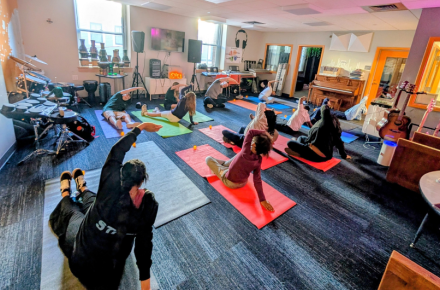The Importance of Self-Regulation for Highly Sensitive Parents and Children

As a highly sensitive parent with two daughters who also have the trait, I’ve had to adjust my ideals about children and parenting. Being a clinician with high sensitivity has offered me invaluable insight into what allows my clients (whether children, teens, or adults) to not only face their struggles, but also to proceed through them and emerge as fuller, wiser people.
Children born with the trait of high sensitivity inhabit a finely-tuned nervous system, and thus are acutely aware of the moods of others. As a parent, I can tell you that our kids read our moods by capturing our facial expressions and sensing our inner collapses. They can even tell when we are not giving them our full attention but pretending to (darn it!). Since this trait is a temperament, it remains present throughout our entire lives, which means that I have never stopped noticing the details in the moods and nuances of our girls, nor they mine.
One of the crucial skills we’ve had to teach and learn is self-regulation. This is no simple task for a highly sensitive teen or parent, especially when one’s awareness of the other can be exquisitely fine-tuned.
Children naturally turn to adults for cues on how to feel or cope. For example, when children hear horrible things in the news, they turn to their parents to understand how to respond—and, if the parent is distressed, the child or teen will tune into that and pick it up. Thus, it’s our job as parents to first handle our own reactions and then provide a calm presence for our children. Again, no easy task.
I have spent focused time with clients helping them “un-blend” from others and get in touch with their own separate selves and inner lives. It has been rewarding watching clients, as well as my own children, take ownership of their inner functioning and experience a sense of being grounded and capable of making choices. With parents, I help them access their own sense of calm, so their children can relax and tend to their inner self-regulation. When each individual learns to tend to their own emotional state, it paves the way for a less chaotic home life. This naturally leads to improved states of being, and in turn, improves our ability to relate to one another within the family.
Teaching highly sensitive children to self-regulate is critical, since those with the trait are capable of feeling deeply just about every emotion there is to feel. Learning to better manage my own feelings and reactions has been helpful, as watching our girls grow up and make bigger decisions for their lives can be quite daunting and scary. Finally, learning to self-regulate has allowed us all to experience a level of peace as we take responsibility for our own internal states, and make choices that create freedom and stability for everyone in the family.
Find out about upcoming programs with Candy Crawford at Kripalu.











































